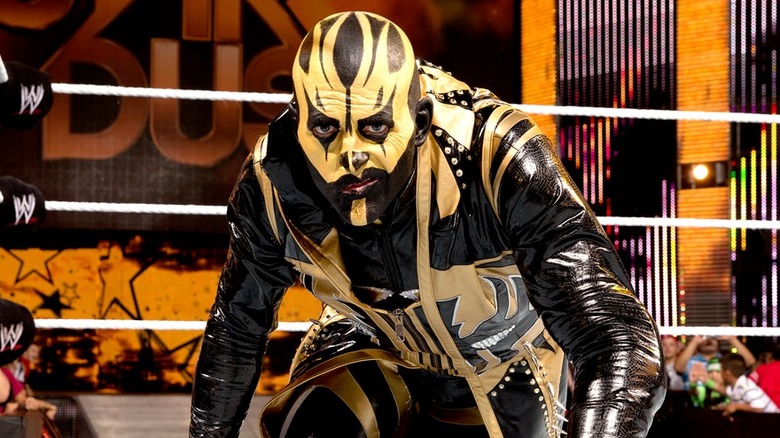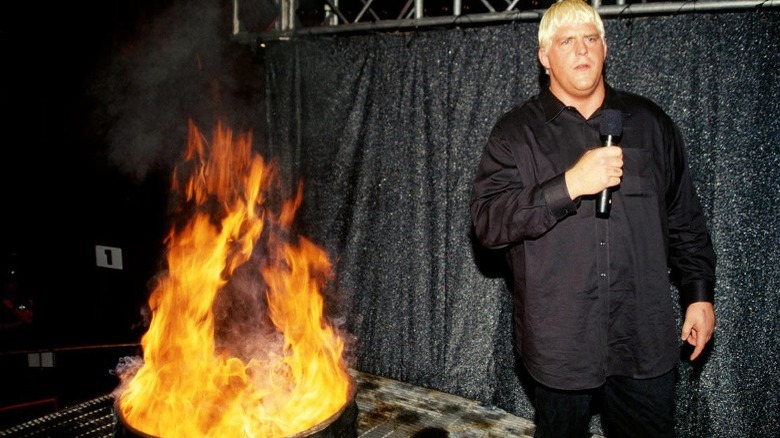Bruce Prichard Contrasts Goldust With The Natural Dustin Rhodes
Long before AEW took shots at WWE to presumably catch the attention of fans, WWE did the same during its Monday Night Wars against WCW. On an episode of "WWE Raw" in the summer of 1997, Goldust — almost randomly — began identifying himself as a family man. Through a sitdown interview alongside his wife Terri, he began speaking on the influence his father, the great Dusty Rhodes, had on his career, and the pressures he had to deal with.
The interview segment made references to his run as "The Natural" in WCW, not to mention cast Dusty in a poor light, which was presumably due to his father still serving as a WCW executive.
Bruce Prichard, a member of WWE's creative team at the time, was admittedly not a fan of WWE making references to a WCW employee. Recapping the controversial segment on his "Something to Wrestling" podcast, Prichard said that WWE made the wrong call by killing the outlandish Goldust character Dustin had portrayed masterfully.
"I didn't like taking Goldust out of the Goldust character," Prichard began. "I knew Dustin wanted to do this, and felt very strongly that there were real feelings and emotions about the Goldust character and Dusty. I just felt that the reason Goldust was Goldust, was because it was a persona Dustin could put on and be someone else. I think he was better at portraying a character than he was as The Natural."
"That Goldust character was so rich, flamboyant, and all-consuming," Prichard continued. "When you take it off of him, he becomes a normal guy. He wasn't interesting, right off the bat, in my opinion. I thought Dustin had come so far in the character work he had done, that when you stripped all that away, all of a sudden, he was a regular guy. I don't think people paid money to see a regular guy next door."
'Nobody gave a s--t about Dustin Rhodes'
Bruce Prichard argued that it would have made sense for WWE to pull the plug on the Goldust character had it flopped, which was clearly not the case. He reiterated that Dustin's brief run as a family man "did not work" and took away from the mystique of the Goldust character.
By May 1998, Dustin's identity crisis reached new levels as he set aflame his Goldust outfit and no longer went by the moniker of The Artist Formerly Known as Goldust — a persona that mimicked celebrities and fellow wrestlers with characters such as "Chynadust," "Sabledust," "Dust Lovedust," "Dustydust," "Hunterdust," "Marilyn Mansondust" and "Vaderdust." The metamorphosis of the character — or regression based on who you ask — did not resonate with Prichard whatsoever.
"Nobody gave a s–t about Dustin Rhodes," Prichard stressed. "They only gave a s–t about Goldust. We stripped him of that, and everything that the audience had an emotional attachment to. It's hard to talk about because I f—ing loved Dustin Rhodes, I thought he was one of the most talented talents I've ever had the pleasure to work with. But when you take a flamboyant character like Goldust and strip it all away, and you make someone a boring husband, I'm not watching TV, and I'm not watching WWE to see a boring husband with a kid who goes on TV and says, 'My daddy was mean to me. We didn't get along.'"
In conclusion, Prichard felt that the storyline could have worked if Dusty were still employed by WWE and could have interjected himself in an on-screen program with his son. "There were more people attached to Dusty Rhodes than Dustin Rhodes. That audience, the WWE fans, didn't watch that other s–t [WCW]. Even if they knew that Dustin was Dusty's son, they didn't care. And I just thought that everything interesting, everything emotional, we took away from him."

